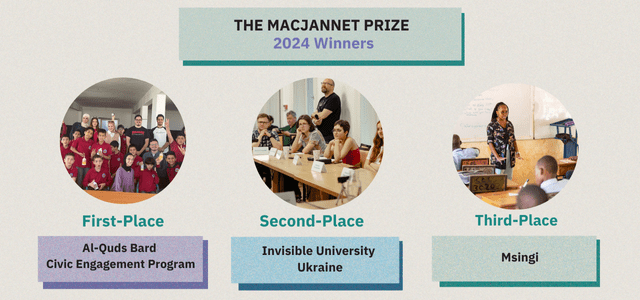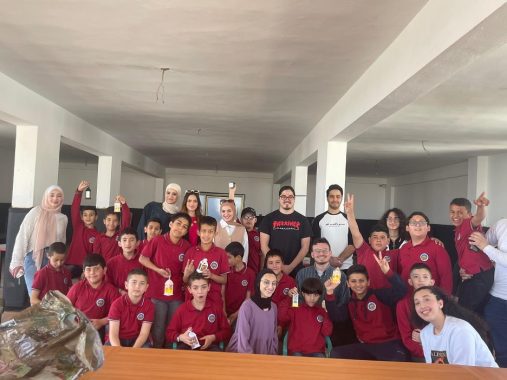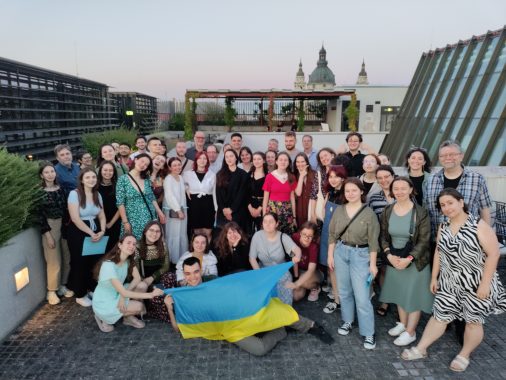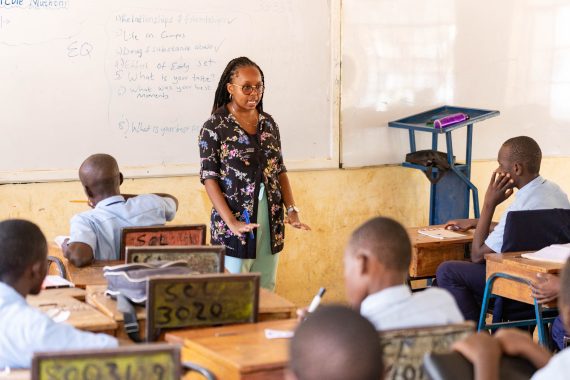2024 MacJannet Prize Winners

About the Winners:
First Place: Al-Quds Bard Civic Engagement Program, Al-Quds Bard College (Palestine)
 Al-Quds Bard Civic Engagement Program is the First Place Winner of the MacJannet Prize for Global Citizenship. Al-Quds Bard College considers civic engagement a fundamental and inseparable part of a liberal arts education. The AQB Civic Engagement Program aims to increase the capacity of the College to operate in the public interest by supporting faculty and students to link classroom and community, and enabling students with the theory and skills to be civically engaged, to develop and organize projects to bring about meaningful and positive changes in society, and to and realize their full potential as community actors and educators in shaping their future, the future of Palestine, and the world.
Al-Quds Bard Civic Engagement Program is the First Place Winner of the MacJannet Prize for Global Citizenship. Al-Quds Bard College considers civic engagement a fundamental and inseparable part of a liberal arts education. The AQB Civic Engagement Program aims to increase the capacity of the College to operate in the public interest by supporting faculty and students to link classroom and community, and enabling students with the theory and skills to be civically engaged, to develop and organize projects to bring about meaningful and positive changes in society, and to and realize their full potential as community actors and educators in shaping their future, the future of Palestine, and the world.
Despite the difficulty of the political developments in Palestine, the College was determined to maintain a lively Civic Engagement Program, and after several pilot activities, took steps to respond to the crisis by developing a Student Network for Civic Engagement, launched in February 2024 in coordination with the student leaders and the Steering Committee on Civic Engagement, as an online network to coordinate between in-person student work based in various regions and cities.
Second Place: Invisible University for Ukraine (IUFU), Central European University (Austria)

The Invisible University for Ukraine (IUFU) at Central European University (Austria) is the Second-Place Prize winner of the 2024 MacJannet Prize for Global Citizenship. The Invisible University for Ukraine (IUFU) is a student-led hybrid academic program in response to the invasion of Ukraine. Through accredited online courses, immersive in-person seminars, and a vibrant peer learning community, IUFU empowers Ukrainian students to continue their studies and pursue their aspirations, regardless of their location or circumstances. With a focus on complementing existing educational infrastructure, IUFU strengthens ties between Ukrainian institutions and global networks, countering the effects of brain drain. With students at the forefront of program design and delivery, IUFU cultivates resilience, academic excellence, and the development of future leaders in the face of adversity. The Invisible University for Ukraine emerged as a collaborative effort among scholars, aiming to extend the university's academic environment to Ukrainian students and scholars following Russia’s aggression against Ukraine. Recognizing the importance of involving Ukrainian experts, the program seeks to establish a global platform for scholarly dialogue amidst the ongoing conflict.
Initially, the program focused on facilitating dialogue between students and distinguished scholars, led by CEU scholars in collaboration with recent graduates. However, it evolved to incorporate active students into coordination roles, putting students at the center of the program. Students began to develop new courses based on feedback gathered during summer and winter schools, and now, over four semesters, six student-initiated courses have been introduced, reflecting a student-oriented approach aligned with participants' concerns and academic interests. Coordination is now overseen by former and current students, ensuring representation from each cohort.
Third Place: Msingi, Strathmore University (Kenya)

Msingi, Strathmore University (Kenya) is the Third-Place Prize winner of the 2024 MacJannet Prize for Global Citizenship. The Msingi (Swahili for foundation) program was established in 2012, with phase one of the intervention dubbed Macheo (Swahili for sunrise). The aim was to foster the holistic development of secondary students from slums in Nairobi in order to increase their transition to tertiary education. This was done through the engagement of teachers, students and parents in fostering excellence at individual and communal level. The Macheo concept was inspired by the Chicago Metro-Mentor initiative, through engagement with US volunteer, Mrs Teresa Bowman. Macheo’s approach was tri-fold; extra academic tuition, character development sessions and exposure through excursion for 25 secondary students from Kibera slums. To foster exposure, the program was run on the university campus so as to shift the attitude and belief of the students concerning access and learning in a university.
In 5 years Macheo had grown to 7 schools, supporting 150 students annually from three slums in Nairobi; Kibera, Mukuru and Kangemi. In its 5th year, the program managed to have two students from the slums join Strathmore University on scholarship. Following its success, Macheo inspired the creation of Project Tai (Swahili for Eagle) in 2019. This was an in-school program reaching 5,000 students annually from 10 schools in rural Kenya, Kitui County. The focus was to build centres of excellence through engagement of students, staff and parents by capacity building them through mentoring for students and training for parents and teachers. The two interventions, Macheo and Tai, led to the creation of the e-msingi platform. The online platform aims to capture and avail best practices we have documented over the 12 years of intervention. E-msingi provides content on subject matter, parental engagement, guidance and counselling support, life skills and pedagogical content to schools in Kenya and Africa at large.
Honorable Mentions
Nufufest, University of Ghana (Ghana) received Honorable Mention. Nufufest is an annual breast cancer awareness campaign which was established by the Paemka Genetics/Genomics Research Laboratory and the West African Centre for Cell Biology of Infectious Pathogens) (WACCBIP) to address the pressing need for breast cancer education and early detection, Nufufest leverages the power of youth engagement, harnessing the enthusiasm and creativity of student volunteers. Through a multifaceted approach encompassing educational workshops, free screenings, and community outreach initiatives, the campaign aims to empower women and men with knowledge, facilitate access to preventive healthcare resources, and build supportive environments for patients and survivors. Learn more.
Third Generation Project, University of St Andrews (United Kingdom) received Honorable Mention. The priority for the Third Generation Project is to put the people most impacted by climate change at the heart of a progressive education agenda. It does this in three ways: First, it creates opportunities to educate diverse audiences – including Western policymakers, academics, students and communities – in practices and advocacy tools that prioritise the voices and local knowledges of marginalized frontline communities. Second, everyone involved collaborates ethically to provide a platform for the voices of marginalized frontline communities, aiming to elevate the profile of collective rights issues. Third, it takes action to challenge the extractive practices of mainstream academic research by developing lasting partnerships with frontline communities and, importantly, taking their cues from them. Learn more.
Tufts University Prison Initiative of Tisch College (TUPIT), Tufts University (United States) has received Honorable Mention. The Tufts University Prison Initiative of the Tisch College of Civic Life (TUPIT) brings Tufts University faculty and students together with incarcerated and formerly incarcerated people, educators, organizers, corrections staff, and scholars of criminal justice to facilitate creative and collaborative responses to the problems of mass incarceration and racial injustice. Extending the vision of Tufts University and Tisch College, TUPIT is dedicated to providing transformative educational experiences that foster student, faculty, and community members’ capacities to become active citizens of change in the world. Learn more.
The Talloires Network would also like to express gratitude to the 9 civic engagement leaders from 7 countries who were part of the international selection committee:
International Section Committee:
Bruce Berzin, MacJannet Foundation Trustee
Katie Hosmer, MacJannet Foundation Trustee
Jude Samuel Acquaah, Ashesi University (Ghana)
Patricio Belloy, Universidad Austral de Chile (Chile)
Gorretti Byomire, Makerere University (Uganda)
Pakiname Mamdouh, American University of Cairo (Egypt)
Taina McField, Tufts University (United States)
Maheen Mumtaz, National University of Sciences and Technology (Pakistan)
Hannah Sender, American University of Beirut (Lebanon)